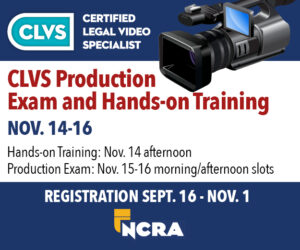 Every three years, each individual with an NCRA certification is required to earn 3.0 Continuing Education Units, or CEUs, which is the equivalent of 30 hours of approved education. Those who have earned NCRA’s Certified Legal Videographer Specialist, or CLVS, credential must earn 1.0 CEU every three years. The deadline for earning CEUs is Sept. 30.
Every three years, each individual with an NCRA certification is required to earn 3.0 Continuing Education Units, or CEUs, which is the equivalent of 30 hours of approved education. Those who have earned NCRA’s Certified Legal Videographer Specialist, or CLVS, credential must earn 1.0 CEU every three years. The deadline for earning CEUs is Sept. 30.
NCRA strongly recommends that Registered Members earn about 10 hours (or more) each year, thereby spreading out the requirement over the three-year cycle. However, if your plans go awry and you find yourself trying to squeeze in lots of credit at the last minute, here are a few tips to help you out.
1. Put first things first. Check your record to make sure every seminar, class, or other learning opportunity has been accounted for in your records. You can access your cycle transcript yourself – and the more time you give yourself the better – through NCRA.org/transcript. If you see that something is missing, NCRA suggests that you resubmit your documentation of the seminar or other learning event in which you participated.
2. Understand the difference between CEUs and PDCs. In every three-year cycle, NCRA members can apply up to 1.0 Professional Development Credit, or PDC, toward the overall 3.0 total units. While CEUs cover things like seminars at conventions or classes, what most people normally think of as an “educational setting,” NCRA recognizes that many members learn through activities that occur outside traditional classrooms. For instance, many members have pointed out how much they learn while serving on an NCRA, NCRF, or state court reporting association board. To recognize this kind of learning, NCRA offers PDCs for board service and several other activities. If you are short a few units, think about whether you have provided something that could be considered for PDCs. A short list of activities is available online at NCRA.org/certifications/CEUs. Note: CLVS holders and those in the reinstatement process may not apply PDCs toward their requirements.
3. Go online for training. NCRA offers an extensive catalog of e-seminars online. The library of seminars comes from a variety of sources, including NCRA conferences, live webinars, and other classes that pertain specifically to court reporters, captioners, and legal videographers. If you missed a specific session at a conference, you can catch up on what you missed and earn CEUs while you learn. Visit NCRA.org/eseminars to view the NCRA E-Seminar Library.
4. Attend a live event. Visit NCRA’s calendar for the list of upcoming live events and find out how many CEUs you can earn at state conventions or other educational opportunities. Many state court reporting associations put on events that offer reporters the opportunity to earn several hours of credit during a one- or two-day event, which may be a fast way to rack up a few units in a short period of time. Visit NCRA.org/meetings/calgrid.cfm.
5. Play a game. NCRA offers a unique learning opportunity through its Courting Disaster online learning game. Courting Disaster was designed to present the business and ethical challenges that court reporters face every day, and players should expect a one-of-a-kind interactive learning experience. To earn CEU credit, purchase a follow-up e-seminar that explores the issues encountered in the game in more detail. Visit NCRA.org/CourtingDisaster.
6. Go back to school. Some college classwork meets the criteria for CEUs, and local community colleges and universities put on a range of classes in many different subjects. Business or finance courses may not only gain you a fair number of CEUs but could aid you in taking the next step with your business.
7. Transcribe for the Veterans History Project. The National Court Reporters Foundation has arranged with NCRA to offer members PDCs at no cost for transcribing recordings for the Veterans History Project. You can earn 0.25 PDC for each transcript submitted; transcribe four in a three-year cycle, and you have taken care of a third of your overall total. For more information, visit NCRA.org/ncrf.
8. Learn to save a life. NCRA grants CEUs for CPR and First Aid courses conducted by the American Heart Association, the American Red Cross, and other organizations that meet the federal standards set by the Occupational Safety and Health Administration and the Journal of the American Medical Association. You can apply up to 12 hours of CPR and First Aid training per cycle toward your CEU requirement. Look online for a class near you.
9. Offer a suggestion for a class. If you would like NCRA to look into whether a program, seminar, or class meets NCRA’s criteria for CEUs, you can ask NCRA staff to look into what you’re interested in. Doing so before you take the class will prevent you from investing in classes that won’t make the cut. To find out whether a program you’re interested in will qualify, email the course description and agenda to ContinuingEd@ncra.org.
10. Request an extension. If all else fails and you are unable to earn enough CEUs by the deadline, you can request a four-month extension period, which would give you until Jan. 31 to earn the remaining CEUs to complete your cycle. There is a $99 processing fee for extending your deadline. The extension request form is available online at NCRA.org/CEUforms.









